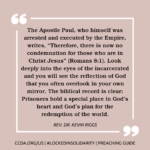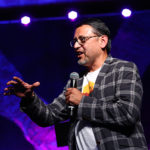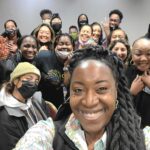At church we sang Chris Tomlin’s “Our God.”
I love this song, and I can’t help but get some goosebumps as we celebrate the bigness of our powerful God.
And if our God is for us, then who could ever stop us? 
And if our God is with us, then what could stand against?
It was three days after President Obama’s executive action offered relief to many immigrant families. And after years of riding the waves of jubilation and defeat in the journey for people-centric immigration reform, I thought, “Yes, God. If you are with us, then nothing can stand against.”
Because I tend to think in video montage, I sang the song while images of justice and celebration scrolled through my mind. Relief for poor people. Immigrants sharing a meal with a no fear of deportation. People dancing in the streets. Because… our God is on our side.
But then I stopped. I didn’t write this song. In fact, it’s super popular with Christians everywhere. Some of the same Christians, in fact, who I see posting on Facebook about English-only or how hospitality is not important. The first person to call me a “low life” on the Internet was the relative of a Christian university connection. And I wonder, “How can we all stand together and sing that God is with us?”
I’m not talking about politics. Not everyone has to agree about how every issue is addressed. Personally, I wish Congress had taken action. But I stood in Washington and listened to politicians basically say that while they agree immigration reform is important, they would rather pass the opportunity because playing games was more important.
But I’m referring to an overachieving theology that favors the poor and the least of these, that stands alongside those people in the margins of society. When I sing Tomlin’s song, I know other Christians are singing it, hoping against the very justice and celebration that dances in my movie-like mind and inspires my gratitude to God.
And sometimes, in my weaker moments, I wonder if I belong in the Christian community. I wonder if God really is on the side of personal gain over the plight of the poor. If God revels in revenge and violence. If God quietly accepts oppression, rather than standing beside those on the outside crying for justice.
But in my better moments, I have hope. I read the Bible and see Jesus favoring the poor and touching leapers. I see God working through Esther to protect the vulnerable. I see God rescuing Israelite slaves.
And then I remember that I don’t want God on my side. I want to be on God’s side. And what I read in the Bible keeps showing me time and time again that God stands in the margins.
So I celebrate a win for immigration reform. I celebrate an executive action that allows families to stay together and vulnerable people to have some peace and protection. I raise my hands and say, “Thank you, God.”
(Sarah Quezada lives in Atlanta, Georgia in a talkative, Spanglish household with her Guatemalan husband and two amusing kiddos. She writes about multicultural life, culture, and immigration at A Life with Subtitles.)



